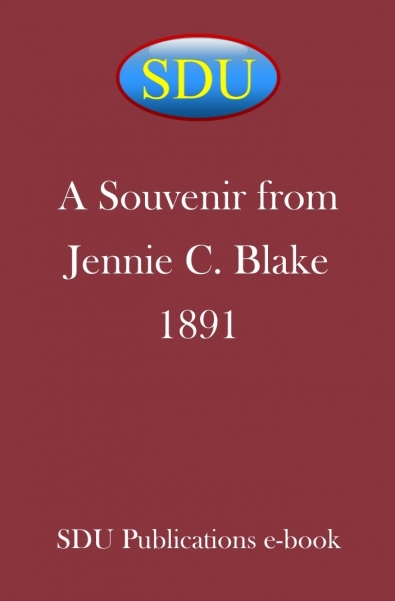DESCRIPTION
Published in 1891 | 50 pages | PDF reader required
UNSEEN REALITIES
Christendom stands aghast at the "Eclipse of Faith." In our own land thousands of churches are unused, or draw but a score of worshipers. The average Protestant congregation is four-fifths women. Science loudly vaunts its final victory over religion. Bob Ingersoll is the most popular preacher, except Talmage. Darwin, Tyndall, Huxley and Spencer are the favorite teachers.
But a reaction has set in. The Unseen World, that has in all ages and nations fitfully set its gates ajar, began some fifty years ago to methodically and persistently force upon the notice of mortals the fact that it exists, and that its life is even more real than the earth life.
Although much actual or alleged fraud has been, naturally enough, mixed with these manifestations, millions of materialists have been convinced of these facts by "Modern Spiritualism."
Many noted scientists still scoff—but a long list of names can be given of those who do not. Even Prof. J. W. Draper, author of "Conflict Between Religion and Science," says: "That the spirits of the dead occasionally revisit the living, or haunt their former abodes, has been in all ages, in all European countries a fixed belief, not confined to rustics, but participated in by the intelligent. * * * * if human testimony on such subjects can be of any value, there is a body of evidence reaching from the remotest ages to the present time, as extensive, as unimpeachable as is to be found in support of anything whatever." And Prof. John Eiske, of Harvard, long the leading American Spencerian, now acknowledges his belief in a personal God and the continuity of life.
In England we find Prof. Crooks and his fellow committeemen, reporting amid a storm of scientific indignation: 1.—That the facts of Spiritism are real, 2.—Whether by spirits or other unknown entities, they upset all the received ideas of natural law. In England also, such writers as Baxter, Wesley, Shelley, Tennyson, the Howitts and the Brownings, long ago accepted the facts. There too, Profs. Crooks and Wallace, and such great minds as a Sergeant Cox, Sinnett, Oliphant, Marion Crawford, Gerald Massey, Anstey and Mrs. Besant are fearlessly placed among those of believers.
In France, where Flammarion is strongly with us, leading the hosts of converts, the Academies, who stupidly derided mesmerism, one hundred years ago, have now rediscovered it and christened it Hypnotism. In Russia 130 most noted names were signed to a protest against the adverse report of the Russian scientific bigots.
In our own land, thirty to forty years ago, such noted men as the following boldly joined us: Horace Greeley, Robert Dale Owen, Judge Edmonds, J. R. Newton, Prof. Hare, Prof. Mapes, Prof, Buchanan, Wm. Denton, A. J. Davis, Wm. Fishbough, T. L. Harris, Dr. Chapin, Geo. Hepworth. Not many now risk their temporal welfare by openly joining us like Prof. Kiddle. Most prefer to call Spiritualism a great wonder which they don't quite understand. They thus get credit for great profundity. Such are Edison, Beecher, Talmage, Heber Newton, Prof. Coues, Lyman Abbott, Leland Stanford, David Swing, Minot Savage.
The attitude of Christendom toward this question may be thus summed up. The honest members of all sects, except the Comptists, are Spiritualists.
In the following pages are specimens of one of the most marvelous phases of Mrs. Blake's mediumship—the poetical.
About four years ago, she began to give forth these poems, under all sorts of conditions. One result was, that when some found their way into print, urgent requests came from editors that the "gifted authoress " should write poetry for them at a "regular salary." She had to reply, that the real authors of the poems had such treasures in heaven, that no salary was any object to them, or could command their services.
On one occasion the subject of the poem, given by a spirit, came in form of a boy, looking so life-like that she asked him what he wanted. In many instances the poems were written through her hand, while she was in a trance.
"The Scottish Mother " was written out through her hand while she was engaged in a lively domestic conversation with relatives; she quite ignorant of what she was writing.
On another occasion a stranger child, fed by her in charity, was made the subject of the poem: the spirit giving the child's name correctly, as was afterward proved.
The poems that have been copied number 1500. Many fugitive pieces of great merit have not been recorded. Her controls often make their answers in poetic style.
It will be observed that these effusions go "from grave to gay"—reach to the extremes of gravity and gaiety. The rollicking Irish poet, Colman, (quite a literary person) has often come back to revise and edit his own and others poems.
When Artemas Ward died, a noble English poet said of him:
"Has he gone to the land of no laughter—
This man who made mirth for us all?"
Some of these poems should forever settle the question whether the spirit world is "a land of no laughter."
Finally, this little volume is intended as a Souvenir from Mrs. Blake to her friends, scattered abroad through this and all lands. It but faintly illustrates the poetical riches she has stored up in such a curious way; but she is assured that many will prize it, at least as a new evidence that the gates, opening into the inner life, are not only "ajar"—but wide open.
Brooklyn, Jan. 1891. C. E. B.

